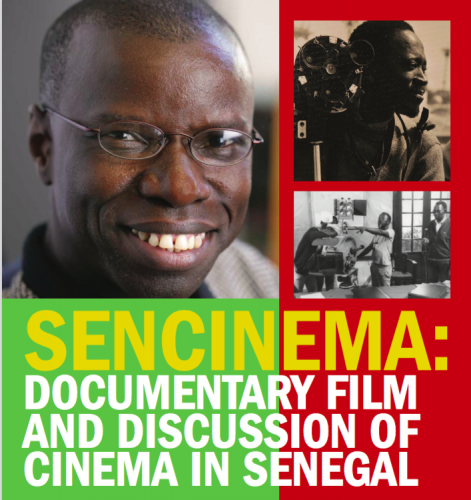SenCinema: Students meet with Senegalese Documentary Filmmaker
By Annie deSaussure, Andrew W. Mellon Postdoctoral Fellow at Bowdoin College
Following Tuesday’s screening, Professor Fofana also visited Bowdoin’s Francophone Cultures course, taught this spring semester by Andrew W. Mellon Postdoctoral Fellow Annie deSaussure in the Department of Romance Languages and Literatures. Fofana’s conversation with students continued over an informal lunch at Moulton Union, attended by French and Francophone Studies students.
SenCinema forces us to consider an often-overlooked aspect of Francophone film. How are films created and financed in Francophone Africa, and, perhaps more importantly, who has access – the means and the ability – to watch and enjoy these films once they are made?
This 30-minute documentary, co-produced by Amadou Fofana and Josh Gibson through a Humanities Writ Large Fellowship at Duke University in 2015, explores the history of film in Senegal. It also examines the various challenges that the Senegalese film industry faces today, including the lack of funding to finance films and the inaccessibility of cinema to the general public. As one woman interviewed in the film puts it: “Senegalese cinema is unknown to the Senegalese people.”
The dire situation of cinema today in Senegal is in some ways paradoxical. The country is home to a rich and long-standing cinematographic history. It is also the homeland of Ousmane Sembene (1923-2007), widely considered to be the father of African film. Many clips from Sembene’s celebrated works, including Borom Sarret (1963), Xala (1975), Moolaadé (2004), and La Noire de… (1966), punctuate the documentary and provide a sense of the richness and creativity of Senegalese film culture.
Historically, film in Senegal has been closely tied to its colonial past. Some of its earliest films date back to the turn of the 20th century. Many of these films, however, were designed as propaganda. They portrayed stereotypes of the native Senegalese populations in order to justify the necessity of France’s colonizing mission, la mission civilisatrice. They depict the Senegalese populations as objects of European gaze, rather than subjects of their own history. Colonial laws, furthermore, formally forbade the local populations from telling their own stories. In 1934, the Laval Decree officially outlawed the inhabitants of colonized nations like Senegal from making films. This decree was upheld until Senegal gained its independence in 1960.
The postcolonial era brought about other challenges for the film industry. Though the newly formed Senegalese government heavily subsidized cinema in the 1960s, the government was forced to pull its financial support in the late 1980s to pay off significant debt to the World Bank. Subsequently, the number of movie theaters in Dakar dropped drastically during the 1990s from 80 cinemas to around 10. Private industries and developers purchased these former theaters and transformed the spaces into churches or commercial centers. The cost of maintaining a movie theater in Dakar simply no longer made financial sense.
Well-researched and balanced, this documentary provides a rich overview of the various voices and perspectives seeking to revitalize cinema in Senegal. One organization, funded in part by the European Union, called CNA Sénégal (Le Cinéma Numérique Ambulant – Sénégal, The Ambulatory Digital Cinema of Senegal) organizes outdoor screenings of digital film for rural populations around the country. This seemingly democratic access to film, however, comes at a price. Local movie theater owners, like Malick Aw, the owner of Cinéma Christa in Dakar, cannot compete with free screenings and are forced to find other ways to stay in business, such as renting out storage space or transforming their theaters into cultural centers.
Despite these challenges, the documentary reminds us of the hopeful resilience of the Senegalese people. At the end of the documentary, we meet filmmaker Joseph Gaï Ramaka whose 2001 film, Karmen Geï, tells the story of a rebellious and defiant woman, a Senegalese Carmen, who seduces both men and women in the pursuit of her own freedom. For Ramaka, Senegal needs more characters like Karmen on its screens. Cinema, he reminds us, is so much more than entertainment or distraction from daily life. Rather, it is the memory and the soul of a nation.
A nation, Ramaka states, must know itself and its past in order to determine where it is headed. Senegalese cinema must overcome many challenges to continue to play its vital role in shaping the country’s future
Dr. Amadou Fofana’s visit to Bowdoin was sponsored with the generous support of the Blythe Bickel Edwards Fund, the Departments of Romance Languages and Literatures, Government and Legal Studies, the Africana Studies Program and the Cinema Studies Program. Special thanks also to the support of Professor Katherine Dauge-Roth and her students, and to Kate Flaherty for coordinating Fofana’s cross-country travel in the midst of a snowstorm.